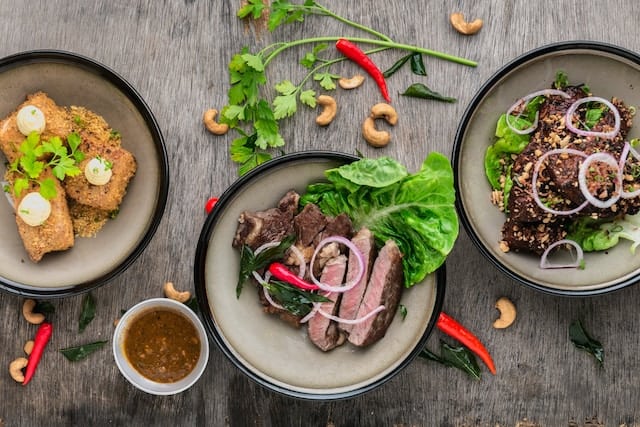Why Food Choices Reflect the Essence of Special Occasions

Around the world, every culture celebrates special occasions with a sense of joy, camaraderie, and festivity. These unique moments, whether weddings, birthdays, holidays, or religious observances, hold deep significance. You might have noticed already that these special occasions are often marked through a selection of food. The food choices made for these events go beyond mere sustenance; they serve as a reflection of cultural values, personal preferences, and the spirit of the occasion itself. In this article, we delve into the complex connection between food choices and the essence of special occasions, exploring how certain traditions are captured or how memorable experiences are created to bring people together.
Embody tradition and heritage
Special occasions are the perfect opportunity to honour and celebrate cultural traditions and heritage. Food, as an integral part of cultural identity, is a fundamental way to convey these traditions to future generations. For example, during Chinese New Year, families gather to enjoy dishes like dumplings and fish, symbolising luck and prosperity. The traditional Thanksgiving feast in the United States brings together a spread of dishes that pay homage to historical and cultural roots. Through these culinary choices, individuals connect with history, learn about their heritage, and preserve rituals that have been passed down through generations.
The connection between food and tradition is not limited to specific cuisines or cultures. Fusion cuisine blends elements from various culinary backgrounds and has become a popular way to celebrate diversity and create new, modernised traditions. It is now common that a couple with different cultural backgrounds choose to merge their culinary heritage during their wedding, symbolising the unity of their families and the beginning of a new chapter.
Craft unforgettable experiences
Food has the power to evoke memories and emotions. The same applies to special occasions, where the act of savouring particular dishes becomes intertwined with the memories of the event. Imagine tantalising aromas of a roast turkey during a Thanksgiving or Christmas Day meal, the explosion of colours and flavours on a wedding banquet, or the sweet treats shared during the Indian Diwali celebration. These sensory experiences become locked in our minds, and transport us back to those special moments whenever we encounter similar flavours or scents.

Nowadays, ordinary events are turned into extraordinary occasions by simply incorporating unique ingredients or gourmet dishes. Anniversaries and other personal celebrations often turn out to be a culinary fine dining feast, creating an ambiance of luxury and romance while milestone birthdays could feature a culinary journey through a specific region, allowing guests to indulge in diverse flavours while celebrating the passage of time.
Foster togetherness and connection
Food brings people together! During special occasions, the act of sharing a meal promotes social interaction, strengthens relationships, and fosters a sense of belonging. From family reunions to birthday parties, a religious gathering, or a national holiday, the communal act of partaking in a shared meal creates a sense of unity and togetherness. Passing dishes around the table or breaking bread together initiates conversations, can break down barriers, and strengthen bonds between people.

Unveil culinary surprises with perfect food choices to enhance special occasions
During special occasions, where food choices symbolise tradition and creativity, there exists a delightful trend that perfectly captures the essence of celebrations. Some companies are dedicated to curating databases of free birthday food offerings, weaving an extra layer of excitement into the celebration. Especially in the US and Canada, across a multitude of restaurant chains, these platforms serve as gateways to a world of complimentary delights, ranging from mouth watering meals and appetisers to tantalising drinks and snacks. This concept of “birthday food,” or other special occasions, enables celebrants to not only savour delectable treats but also strengthen the joy of a milestone day.
Preserve culinary heritage
In an era of rapid globalisation and changing lifestyles, preserving culinary heritage should not be underrated. Special occasions provide a platform for keeping food habits, traditional recipes and cooking techniques alive. From particular sweets of Eid al-Fitr in the Middle East to the elaborate feasts of Chinese New year celebrations, dishes carry stories of generations past. Through the preparation and the enjoyment of these time-honoured foods, families and communities transmit cultural heritage to keep it vibrant and relevant. The transmission of this culinary knowledge through generations is a form of cultural continuity that transcends time and binds families and communities together.
Cater to evolve tastes
Societies evolve and tastes shift, and so do the culinary choices. Modern food trends, dietary preferences, and health considerations influence more than ever the composition of celebratory menus. Many occasions now have to feature options for vegetarian, vegan, gluten-free, and other special diets, ensuring that everyone can partake in the festivities. Besides, fusion cuisine continues to flourish, reflecting the contemporary, modern fusion of cultures and flavours. The adaptability in food choices allow special occasions to cater to a diverse range of preferences, creating inclusive environments where everyone can celebrate without compromising on their values or beliefs.
Symbolism and cultural significance
Dishes chosen for special occasions often carry symbolic meanings deeply rooted in cultural, religious, or historical contexts. Check out our article about mooncakes. The round shape of mooncakes during the Mid-Autumn Festival in many Asian cultures represents unity and completeness. Similarly, the inclusion of bitter herbs and unleavened bread during the Passover Seder symbolises the bitterness of slavery and the haste of the Israelites’ departure from Egypt. These symbolic food choices reinforce the significance of the occasion and create a sense of shared understanding among participants.